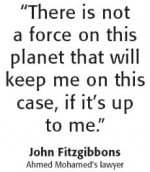Mohamed, lawyer want out of strained relationship

In a tense courtroom exchange Wednesday, attorney John Fitzgibbons argued to withdraw from proceedings in which he had, until now, represented Ahmed Mohamed, one of two suspended USF students arrested on explosives charges last year after a traffic stop in South Carolina.
The motion was originally brought about by Mohamed, who declined to meet with his lawyer Sunday. Instead, Fitzgibbons was given a note at the jail relaying his client’s wish to sever their relationship because Mohamed didn’t think his attorney was fully representing his interests. Mohamed also felt he was being deceived by Fitzgibbons about his plea options, and said that Fitzgibbons was “his only real contact with the outside world.” He has had limited contact with his parents in Cairo and the Egyptian Embassy, Mohamed said. And because he was “in confinement,” Fitzgibbons’ behavior – which was marked by references to compromise, settling and serving time – was inappropriate.
Mohamed also claimed Fitzgibbons threatened him, saying: ‘You have no choice, you will obey me.'”
Because Mohamed and his family were “green when dealing with federal issues,” the one-time engineering graduate student said, they put their complete trust in Fitzgibbons and were betrayed.
Mohamed also brought up the attorney’s fee, which is being paid by the Egyptian Embassy, in his list of complaints. Mohamed – an Egyptian national in the United States on a student visa – contended that his country’s embassy was paying Fitzgibbons $750,000. Mohamed didn’t think price was appropriate because Fitzgibbons wasn’t diligent, he said. Fitzgibbons said he was only paid $700,000.
“Instead of working like (the other arrested student’s attorney), is working to postpone all the time,” Mohamed said, referring to Megahed’s attorney, assistant U.S. public defender Adam Allen.
Allen recently argued that the evidence collected in the Aug. 4 traffic stop was illegally obtained because of racial profiling.
Magistrate Judge Mark Pizzo said Mohamed’s lawyer still had until late January to file a similar motion, and that he would be prepared to conduct a hearing to decide if what occurred after the traffic stop was legal.
When Mohamed finished his explanation, Fitzgibbons requested an opportunity to reply to the accusations, during which he said that the claims were “pure fantasy” and “absolute falsehood(s).” Fitzgibbons said Mohamed was wrong about the facts and the amount of money he received for his services. He added that his client’s situation was much more difficult than Megahed’s because Mohamed gave the FBI permission to search his computer and gave them damaging statements.
The attorney went on to say that he had never had a single conversation about how his client should plea or whether Mohamed should compromise with the U.S. government.
After hearing Mohamed’s complaints, Pizzo asked Mohamed what he would like to do. Mohamed replied that the decision to keep or relinquish Fitzgibbons’ service rests with the embassy. If Fitzgibbons agreed to repay enough of the fees to hire a new federal attorney, the embassy would do so, Mohamed said.
Fitzgibbons said he had consulted the Florida Bar – a professional organization that licenses lawyers in the state – and they agreed it would be appropriate to return all fees that were not used on the case. Fitzgibbons promised to consult his notes and make the necessary calculations.
Pizzo spoke in Fitzgibbons’ defense, saying he had known the man for more than 20 years and had worked with him in many capacities.
“I find it hard to believe that Mr. Fitzgibbons in any way … strong-armed you to plead guilty or compromise, using that term, as you say (he did),” he said. Pizzo said he knew Fitzgibbons to be “an excellent lawyer who has and would represent (Mohamed) diligently and under the highest standards the court could expect.”
He noted the attorney’s request, which Mohamed refused, for a private meeting to resolve discuss the motion instead of having a hearing, saying that it was clear evidence Fitzgibbons was acting in his client’s interest and trying to prevent the airing of “dirty laundry” in public.
He urged Mohamed to carefully consider whether or not to hire a new attorney for a number of reasons, including the weight of charges against him.
“I believe the first count carries 20 years and the second carries 10 years (maximum penalties), and each carries a fine up to $250,000.”
The consequences, he said, would be the defendant’s to bear alone.
Pizzo also said any new attorney hired would not be guaranteed a continuance, a request for more time to prepare before the trial, and that proceeding speedily to trial was not necessarily the same as proceeding intelligently, referring to what Fitzgibbons called his client’s determination to go to trial “come hell or high water” in March.
Pizzo hopes to make his decision Jan. 14, when the hearing will continue. If Fitzgibbons is allowed to break away from the case, the embassy will have to hire a new attorney with the fees he would return. If those remaining fees are not sufficient to hire different counsel, one will be provide by the court.
Before adjourning, Pizzo suggested that Fitzgibbons’ reputation might benefit his case and his efforts to persuade the court.
Fitzgibbons’ last remarks illustrate the estrangement, as he called it, between a attorney and client that would be impossible to mend. He called Mohamed “the most difficult client I have had in 20 years.”
“There is not a force on this planet that will keep me on this case, if it’s up to me,” he said.






